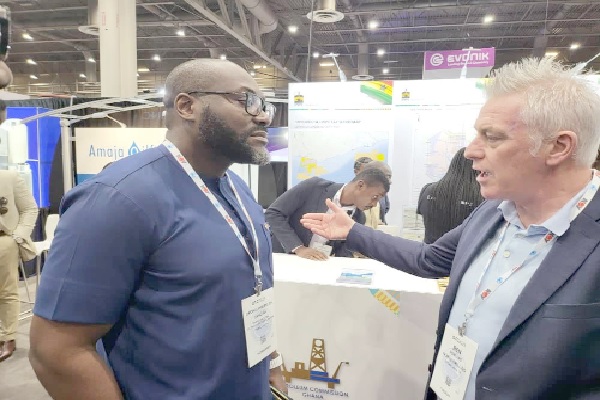
We’ll reverse declining oil output — GNPC CEO
The Ghana National Petroleum Corporation (GNPC) is optimistic that crude oil production will rebound in the medium term after suffering steady declines in the past three years.
After peaking in 2019, Ghana’s annual crude oil production has been on a steady decline. It fell by almost six per cent to 51,756,481 barrels in 2022 – below the government’s projections – impacting negatively on revenue targets.
While expressing concern about the development, the Chief Executive Officer (CEO) of GNPC, Opoku-Ahweneeh Danquah, told the Graphic Business that ongoing investments into the three producing fields and a strong campaign for increased exploration for proven reserves would help to raise output in the coming years.
“Our goal at GNPC is to increase production in conjunction with our partners and firm up the country’s reserves.”
“The petroleum resources are there; we just need more investment to technically firm them up as proven,” Mr Danquah said in an interview at the just-ended Offshore Technology Conference (OTC) at Houston, Texas, in the United States of America (USA).
Oil and gas reserves are proven through drilling and exploratory works to verify the quantities and qualities of the discovery. Mr Danquah said the decline in production was not unusual as it was normal for output to plateau and naturally decline whenever reserves were not proven and replaced steadily.
To help sustain and ramp up the country’s crude oil output, he explained that exploration activities within the western basin needed to be intensified, as was the focus of the corporation.
Strong investor interest
The GNPC CEO said Ghana was a hotbed for petroleum resources, with “so many prospective areas that have not been explored.
“These virgin areas, he said, required significant investments to help develop.
He said investors at the 2023 OTC had also shown strong interest in the country’s petroleum sector, brightening the prospects for increased exploratory works in the coming years.
Beyond that, Mr Danquah said: “Ghana will always be an attractive place for mineral resources as well as oil and gas exploration, and we are far from exhausting the spectrum of our petroleum resources”.
“When comparing aggregate upstream exploration activities in Africa’s Gulf of Guinea to America’s Gulf of Mexico, we are barely at the tip of the iceberg,” he said.
Ghana started crude oil production in 2010 and had been enjoining a steady rise in annual output until 2020, when it suffered its first decline.
Since then, it has been falling by an average of 10 per cent – contributing to the fiscal deficits and the general macroeconomic imbalances.“
If you look at projections about seven years ago, Ghana was supposed to be producing at least half a million to a million barrels a day by now.
But as was the case for most upstream companies, the pandemic hit oil and gas demand hard. “Today, demand has recovered, and we are optimistic for the future,” he said.
“To further develop the working petroleum system in our offshore basins by drilling more wells, we require significant investments as well as requisite technologies that are not indigenous,” he said, noting that it was one of the main reasons for the corporation’s participation in the OTC 2023.
Voltaian Basin
At the OTC, which is an annual gathering of companies and service providers in the petroleum sector globally, GNPC exhibited the Voltaian Basin, the country’s first onshore acreage that the corporation was looking to undertake first drilling in the first quarter of next year.
Its CEO said interest in the basin had been “strong” and that the corporation was aiming at retaining a greater share of the basin unlike offshore finds where the country’s stake was lower and financially carried until production.
He said the current economic challenges facing the country required that innovative and informative strategies were taken to attract investors with deeper pockets.
Pecan field
Meanwhile, in a report that explored the fortunes of the country’s oil and gas sector, Fitch Solutions said in February that while investments in the Jubilee and Tweneboa-Enyenra-Ntomme (TEN) fields would prevent significant short-term declines, the key upside to Ghana’s longer-term oil production outlook was the Pecan Field Development.
The field, which is owned by Aker Energy as the operator with Lukoil, GNPC and Fueltrade as other shareholders, is projected to pump 110,000 barrels per day (bopd) when production begins.“Further progress on the final investment decision (FID) in the Pecan development is essential for Ghana to return to pre-pandemic levels of oil production (which averaged 197,000 b/d in 2019),” the data and research firm said.
It is part of the Deepwater Tano Cape Three Points licence block and has estimated reserves of 334 million barrels of oil equivalent (boe).